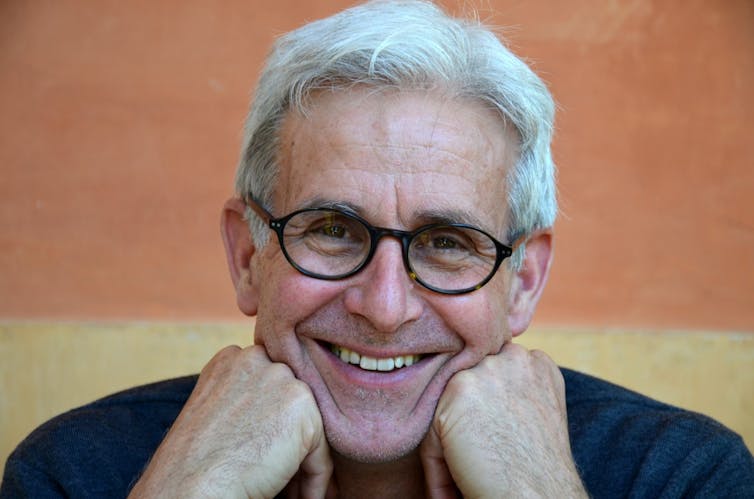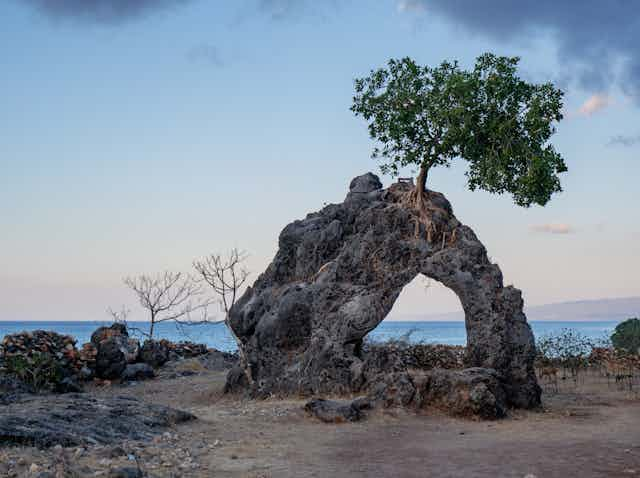The Idealist is the eighth novel by respected Australian writer and academic Nick Jose. Set in the turbulent period leading up to the referendum for East Timorese self-determination in 1999, the novel has the form of a political thriller, albeit one that remains restrained and meditative.
Review: The Idealist – Nick Jose (Giramondo).
The “idealist” of the novel’s title is a former solider turned Defence analyst named Jake Treweek, who has been sent to Timor to provide intelligence on the evolving situation. Supplied with a false identity by the department, he poses as a plumber working for AUSAID.
The action takes place in the shadow of two dramatic ironies. The first, which is the condition of all historical fiction, is the irony that we – unlike the characters – know how this story turns out, at least in general terms.
The 1999 referendum was not without violence, but it did not yield the bloodbath that was feared, given the history of brutality since the Indonesian invasion of East Timor in 1975. In the period before the referendum, the presence of Australian-led UN troops INTERFET was crucial in quelling the violence that flared between rival militias and, in 2002, East Timor became officially independent.

The second dramatic irony comes directly from hardboiled detective fiction: we know from the outset that Jake is now dead. He died in an apparent suicide at his Washington DC apartment. His wife Anne found his body inside their car with the engine running and the exhaust funnelled into the interior.
The novel begins with Anne relating this story to their childhood friend, David, who is now a successful Sydney barrister. Jake, Anne and David had all grown up together in Adelaide, part of a circle of well-to-do families that also included Henry Hunt, who would go on to become Australia’s Foreign Minister.
Anne believes her husband’s death was suspicious and asks David to investigate. But the novel does not proceed in the form of an investigation. Instead, it shifts its focus back to Jake. The bulk of The Idealist, in particular the crucial East Timor segments, are narrated from his perspective.
Read more: Possession and devotion inform Sarah Krasnostein's compelling reinterpretation of Peter Carey's art
Espionage
The Idealist is in many ways a classical espionage novel, replete with possible double agents, sultry expatriate hotels, Machiavellian politicians and exotic femmes fatales. That it all transpires in the very early days of the internet era, and before smart phones, gives that special charge to communication that made intelligence so alluring in this era.
Jake, though, is not quite the ice-cold agent that the genre has made familiar. He is a country boy and sometimes struggles to read the room. He falls in love with a beautiful Timorese woman and, though he is mindful of styling himself as a white saviour, this fantasy still captures him.
The drama of the story is generated by the fact that Jake is not supplying the version of events that his masters in Canberra want. When he is posted to Washington, he confides in his US counterpart, which proves embarrassing to Canberra and puts a target on his back.
The Idealist has some similarities with Jose’s earlier novels The Red Thread (2000) and Original Face (2005), both of which have elements of the detective novel and the political thriller. It is not only a stylish addition to his oeuvre, but to the literature of Australian interactions with Indonesia.

Any book about East Timor will revive, in Australian minds, the killing of five journalists covering the Indonesian invasion in the town of Balibo in 1975. But the book The Idealist will most likely call to mind is Christopher Koch’s classic novel The Year of Living Dangerously (1978), which is set during the Indonesian political crisis of 1965 and follows a group of journalists who are covering the events from Jakarta.
While there are some resemblances to Koch’s novel in the plotting, texture and mise-en-scène of The Idealist, Jose’s heroes mostly eschew the braggadocio of the journalists in The Year of Living Dangerously. One of the novel’s interesting elements is that its central group of protagonists grew up together in the genteel environs of the Adelaide Hills.
In its early sections, which mostly follow the recently widowed Anne as she tries to make sense of the death of her husband, we are taken back to the formative years when she, Jake, David and Henry came together. We learn that Jake and Henry were schoolmates at a prestigious private school and that Jake, a scholarship kid from a poor farm on the Yorke Peninsula, was drawn into the orbit of Henry’s wealthy family.
Henry’s father was a federal Member of Parliament and it was widely understood that, in due course, Henry would succeed him in that seat. When we reach 1998, when most of the novel takes place, Henry has indeed succeeded his father and is now the Minister of Foreign Affairs faced with the complex situation in East Timor.
It is here that Jose’s fictional foreign minister must inevitably evoke his real-world counterpart, Alexander Downer. This historical parallel is an intriguing aspect of the novel, one that points to the fissure between its status as a fictional drama and its grounding in the real-world events of East Timor’s fight for independence.

The Idealist does not shy away from the problem of Australia’s motives. Indeed, a bibliography of sources and further reading is appended to the novel for the interested reader. Yet, while the question of Australia’s role is never fully answered, it is this uncertainty that drives the novel’s plot and provides the basic moral framework for the action.
Australia was deservedly commended for its role in securing East Timor’s independence. In the wake of Suharto’s downfall, the Howard government lobbied the new Indonesian leadership to hold a referendum to determine the people of East Timor’s preference. Prime Minister John Howard wrote directly to Suharto’s successor, President B.J. Habibie, proposing this as a way forward. The speed with which the suggestion was taken up came as something of a surprise to Australia.
Australia’s support for East Timorese independence was a dramatic change of position, reversing a quarter of a century of acquiescence to the violent seizure of the former Portuguese colony. The novel paints a picture of an Australian military and foreign affairs culture that had been more than happy with the status quo. Jake’s reports of abuses being committed in East Timor are generally minimised and recast within the preferred Indonesian narrative of domestic tensions.
The motives for the policy U-turn were no doubt complex, and the novel canvases a number of them. An important element was Australia’s interest in the subsea oil and gas reserves of the Timor Gap. Indeed, the persistence of East Timor in Australian consciousness is partly driven by the ongoing negotiations between the two nations regarding the ownership of this resource. The revelation that in 2004 Australia planted listening devices in the offices of East Timorese negotiators has led to a protracted dispute and the criminal prosecution of the Australian intelligence officer, known as Witness K, who blew the whistle.

The hard line Australia took in these negotiations with its tiny, impoverished neighbour sits uneasily with its support for independence. Why would Australia fight for East Timor’s political independence, then act so strongly against its economic independence? It lends some support to the suspicion that the oil and gas field was always in Australia’s sights and determining its policy stance.
In The Idealist, the significance of the energy asset in the Timor Gap becomes one of the sinister backdrops to what seems to be a story of liberation. Jose has spent time as a diplomat. He knows the language and psychology of these circles. He has written an intelligent and compelling political novel that draws its sensibility from the Cold War and has some of the stern elegance of John Le Carré. The Idealist captures the interplay of masculine rivalry and ambivalent patronage, animated by the peculiar eros that goes with work in “the field”, which seduces Jake and sends him on his fatal course.
The importance of ideals is one of the book’s key themes; it is what stops the geopolitics from remaining at the level of the Great Game. It is uncertain whether Jake’s ideals are ever clear to him. But in the end this is not quite as important as his intuition that decisions made by those in power can have dramatic effects on the lives of ordinary people.

